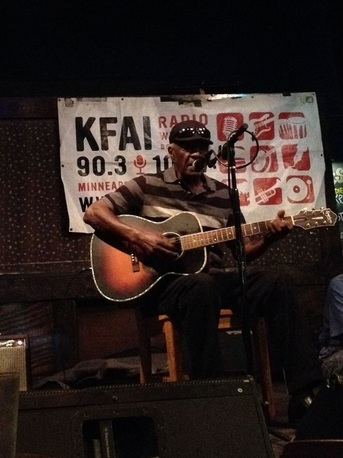
by Erik Ritland
Rambling On is a seriously fun blog and podcast covering sports, music, culture, and more. Check us out on Reddit, Twitter, Facebook, or at our website.
There are a lot of interesting facts about Jimmy "Duck" Holmes. He was born to sharecropper parents who opened The Blue Front Cafe, one of the last remaining juke joints, a year after he was born. He grew up around the family business, eventually becoming its proprietor, which he still is today. Famous names that have played there include Jack Owens, Bud Spires, and one of the most important pre-war country blues artists, Skip James.
The most important thing about Holmes is that he is a genuine link to one of the most powerful forms of 20th century music, the country blues of the 1920s and '30s. His liveliness and the intensity of his performances prove its eternal vitality.
Holmes plays the Bentonia style of country blues (named after its birthplace, Bentonia, Mississippi). Its most famous practitioner was Skip James, whose legendary 1931 sessions included influential blues standards "Devil Got My Woman," "22-20 Blues" and "I'm So Glad" (which Cream famously covered in the '60s). The distinctive, haunting feel of his songs, and of other practitioners of the Bentonia style, comes from a rapid fingerpicking style and open minor chord guitar tunings.
Holmes' approach to guitar playing is equal parts intensity and subtlety. He uses all his fingers across the entire fretboard to create a big, melancholy sound. This was used to full effect on "I'd Rather be the Devil," his version of Skip James' seminal "Devil Got My Woman." There's a strong spiritual element to his playing that comes across in every note. Close your eyes and you'd swear you were hearing James at a '30s juke joint.
"Train, Train," his re-working of the Junior Parker standard "Mystery Train" (which Elvis Presley and the Band popularized), showed another unique aspect of the Jimmy "Duck" Holmes experience: he doesn't stick to traditional 8 or 12 bar blues formats. His extra guitar licks and floating verses are invigorating and add an element of unpredictability. Energetic "All Night Long" and "Red Rooster" were two other examples of this.
Holmes finished up with a version of underrated bluesman Sleepy John Estes' "Broken-Hearted, Ragged, and Dirty Too." The fun song begins with one of those classic, twisted old time lyrics: "I'm broken-hearted, ragged and I'm dirty, too/and if I clean up, pretty mama, may I stay all night with you?" It ended his set on an upbeat, lighthearted note.
I know what you're thinking: "Damn it! I missed his show at the 331. Will I have to travel to Mississippi to see him?" Well, you're in luck, as he's playing several dates in the Twin Cities and surrounding area in the coming days, some with Minnesota blues legend Charlie Parr.
Most notably he'll be at the Roots, Rock, and Deep Blues Festival on Saturday (Patrick's Cabaret Stage, 6:00 PM). Don't miss this rare opportunity to see a vibrant link to some of the most important music in American history.
Click here for a complete list of dates Jimmy "Duck" Holmes will be in town.
Erik Ritland is a writer and musician from St. Paul, Minnesota. His blog and podcast Rambling On features commentary on music, sports, culture, and more. He was also Lead Staff Writer for Minnesota culture blog Curious North. Support Erik's music via his Patreon account, reach him via email, or find him on Facebook and Twitter.

 RSS Feed
RSS Feed
